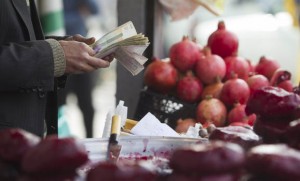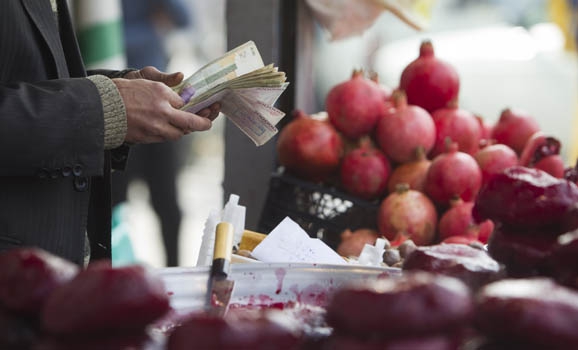
(Reuters) - Iran's�food distribution�system is in crisis even though Western sanctions do not directly target the market, badly hurting the poor and turning some staples into luxuries.
Private importers are shrinking away from deals made risky by turmoil in the rial currency, and many foreign banks are reluctant to finance even trade exempt from the sanctions for fear of drawing fire simply for doing business with�Iran.
The result is that the Iranian state is under growing pressure to import and allocate more goods as it tries to avoid any social unrest due to shortages and soaring prices.
An increasingly shaky state apparatus will struggle to fill the gap often left by private companies, analysts say.
"If you are talking about the number of deals needed for a country of 75 million ... you do not have an organized overall strategy for�finance, purchase and distribution. I do not think they can cope with the challenge," said Scott Lucas, a specialist in Iranian affairs at Birmingham University.
"Even if the sanctions were lifted, which is a huge if, the problems in the system are now so endemic I think they face real serious structural problems."
Sanctions led by the United States and European Union, designed to halt Iran's nuclear program, are strangling the�economy�and particularly energy exports, but so far Iranians do not face a widespread humanitarian crisis.
Nevertheless, many foreign foods are hard to find and high prices mean Iranians cannot always afford even basic items.
Hossein, a Tehran shopkeeper, described the problems faced particularly by the poor. "A few days ago an elderly woman came to my shop to buy 12 eggs, but when I told her how much she had to pay, she decided to just take five. I really felt bad because she is old and lives by herself," he said by telephone.
The problems have become politically charged. Earlier this year Iran's police chief urged television stations not to show people eating chicken to avoid fueling social tensions, as a jump in poultry prices has made it a rarity in many homes.
Even the relatively well-off are feeling the effects. "Not only have we had to cut back on less important things, we are also forced to purchase local products. I haven't had real, good chocolate for a long time," 25-year-old management student Sanaz said by phone from Tehran.
Iran is estimated to consume around 15.5 million tonnes of wheat a year and about 2.6 million tonnes of sugar.
The sanctions on the nuclear program - which Western governments fear is aimed at making weapons, despite Iranian denials - helped to push the rial into a nosedive earlier this year. The currency has since stabilized, but importers are finding it increasingly difficult to buy dollars for purchases, and are wary of getting caught out by another currency swing.
Instead, many commercial buyers are preferring to lock in their wealth in real estate or safe haven assets such as gold.
BANKING FREEZE
International trade sources say Iran is also having to grapple with a banking freeze, which has led to private traders cutting imports of staples such as grain and sugar.
Some banks fear their reputation will suffer with Western clients if they finance any Iranian trade, even when it is legal, and therefore prefer not to take the risk.
A senior executive with an international�commodities�firm said it had stopped food trade with Iran. "We are running scared. Even though the food trade is not contravening sanctions, our banks could turn around and say they are not happy, so the relationship risk is a big factor now," the executive said.
In one blow, an official with the Geneva-based private banking branch of India's Hinduja Group said this month that tougher U.S. measures introduced in July by the Office of Foreign Asset Controls (OFAC) had forced it to stop providing trade finance for food and�pharmaceuticals�to Iran.
"The private sector is the main casualty of the sanctions. Private buyers are still able to import but in much smaller volumes than in the past and at much higher prices," a European based grain trader said.
A Dubai-based official with Afra Holding, a unit of a large Iran-based conglomerate, said the group had scaled back cargoes of sugar and grain to one shipment a month from five vessels previously, citing payment difficulties caused by sanctions.
Government buyers, including state food body GTC, are playing a bigger role to maintain strategicstocks.
A GTC official told Reuters by phone that it had "no limits" on importing sugar and�grains, and was buying directly from companies at suitable prices. GTC was importing around 60,000 tonnes a month, mostly of wheat, the official said.
MALNUTRITION FEARS
One European diplomat acknowledged the knock-on effect. "There is no ban at all in humanitarian terms but admittedly trade of food and medication is being affected. We are concerned about it and we are looking at it quite closely because the last thing we want to see is a serious malnutrition issue, for example," the diplomat said.
"It's more the problem coming from the U.S. - the choice between doing business in Iran or doing business in America. Such a calculation gets lawyers overly jumpy. It's utter risk aversion."
Iranian authorities say sanctions have had little effect on the state, but point to an increasing impact on the population. While officials have accused European countries of blindly following the United States in imposing trade sanctions, the government is facing growing scrutiny at home.
Opponents of President Mahmoud Ahmadinejad accuse him of economic mismanagement. Last week parliament called off plans to grill him after Supreme Leader Ayatollah Ali Khamenei said they must not act in the interests of Iran's enemies.
Birmingham University's Lucas cited disorder in the state system. "A recurrent problem in the Iranian�economy, especially during the Ahmadinejad years, is the increasing number of state actors who are involved in economic affairs and that does include the Revolutionary Guards," he said.
The Revolutionary Guards, which report directly to Khamenei, hold influential positions in the economy and politics, and Washington has targeted entities linked to it for sanctions.
"You have official state actors and unofficial state actors who have got their hands involved. It leads to disorganization and you do not necessarily know who you are dealing with," Lucas said.
Iraj Nadimi, a member of parliament's economics committee, was reported by the Fars News agency as saying the government had made a decision to boost food�stocks.
"The decision of the government is to increase food stores from 3 to 6 to 9 months which is not a bad decision and is suitable to prevent increases in prices," Nadimi said.
Nevertheless, the worsening problems are being felt in other areas of Iran's food system.
Masumeh Abad, director of Tehran's municipal health committee, said distribution of milk in schools was being limited. "This is a subsistence food and a priority and if before they drank a glass of milk every day now they drink half a glass," she was quoted by the Mehr news agency as saying.
"EVERY MAN FOR HIMSELF"
A former U.S. OFAC official familiar with Iran trade confirmed foreign firms were pulling back due to payment problems. "Some companies are not getting paid because financial institutions are not going to take the risk to process transactions," the source said. "The result is some have stopped and closed up their Iranian business."
Others such as U.S. headquartered trade houses Cargill and Bunge said they were still exporting agricultural commodities to Iran in accordance with applicable sanctions laws. "Trading out of Geneva, we source these agricultural commodities from around the world," Cargill said.
A Middle East-based trade source said Iran's GTC was trying to do deals in cash to meet the rising buying requirements.
"It's every man for himself with the private sector in Iran now and they are scrambling to secure their assets, which will mean they are not going to take a risk with food imports," he said. "This is bound to raise the pressure on the state buyers to deliver."
The Iran Project is not responsible for the content of quoted articles.











